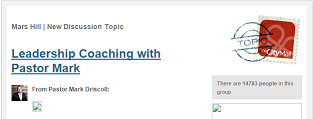This morning Sutton Turner posted his third in a series of reflections on the ResultSource decision and church governance.
Mainly Turner concerns himself with the debate over the role of elders in a large church versus a small one. Instead of making a biblical argument, he offers a utilitarian defense of bringing in outside advisers to govern a church they don’t attend. His rationale is that God has allowed mega-churches to get really big so He must be fine with different rules for them.
If a plurality of elders isn’t working maybe something is wrong elsewhere. Maybe the church is too big. Mars Hill could have given autonomy to video sites but the executive elders didn’t let it happen. For instance, Orange County campus pastors wanted to avoid fines from the city of Santa Ana, CA and re-locate. However, Sutton Turner said no.
Turner’s sense of Mars Hill’s history on governance is at odds with my conversations with former Mars Hill members. In addition, Wenatchee the Hatchet has a wealth of information on the governance before and after the 2007 purge of Paul Petry and Bent Meyers. He establishes that the elders did not need to vote unanimously to pass an item.
I found this paragraph to be hard to bring together with the many interviews I have done with Mars Hill former members and pastors:
Back in 2007, Mars Hill had migrated away from plurality of elders in its formal governance structure, but the strains of plurality still remained within the church culture. Every man who became a pastor, whether paid or volunteer, went through the “eldership” process to ensure the character qualifications of 1 Peter 5 and 1 Timothy 3 were met in the man’s life and home. Although the by-laws clearly stated otherwise, many church members assumed those pastors were directly involved in the governance of the church, even in 2014. Some of the pastors in 2014 felt that all 60 pastors should still be governing elders and all 60 pastors should operate in plurality on all decisions.
Mars Hill was jolted away from a plurality of elders by Mark Driscoll and his supporters in 2007. He later said it was because he needed the governance to change for his benefit. Turner says the congregation assumed that pastors were in charge. This would be a natural mistake because one, it makes sense, and two, members were often denied access to the by-laws. They appeared on the website in 2014 after I pointed out in a blog post that the state of Washington requires non-profits to make by-laws available.
Turner closed by saying he plans to write about Mars Hill Global. Looking forward to those posts.
 Today,
Today,